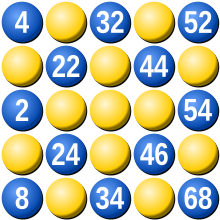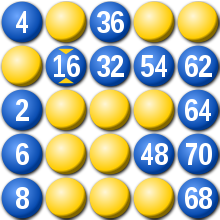
Jotto is a code-breaking pen and paper word game for two players. Each player picks and writes down a secret word and attempts to guess the other's word first during their turn.

Pyramid is an American game show franchise that has aired several versions domestically and internationally. The show was developed by Bob Stewart. The original series, The $10,000 Pyramid, debuted on March 26, 1973, and spawned seven subsequent Pyramid series. Most later series featured a full title format matching the original series, with the title reflecting an increasing top prize. The game features two contestants, each paired with a celebrity. In the game, the contestants and celebrities attempt to identify words or phrases through clues given by their teammates. The title refers to the show's pyramid-shaped gameboard, featuring six categories arranged in a triangular fashion. The various Pyramid series have won a total of nine Daytime Emmys for Outstanding Game Show, second only to Jeopardy!, which has won 13.
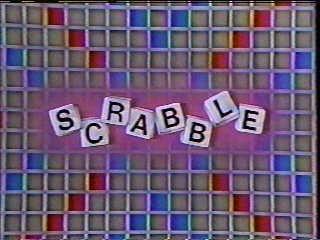
Scrabble is an American television game show based upon the board game Scrabble. Contestants competed in a series of rounds to fill in words within a crossword puzzle for cash. Muriel Green of Exposure Unlimited developed the idea for a television game show based upon the board game concept. During 1983, Green convinced Selchow and Righter, who at that time owned the Scrabble board game, to license Exposure Unlimited to produce the game show. Exposure Unlimited co-produced the show with Reg Grundy Productions, and licensed the show to NBC. Scrabble aired on NBC from July 2, 1984, to March 23, 1990, and again from January 18 to June 11, 1993. Chuck Woolery hosted the program. Jay Stewart was the announcer for the first year. Charlie Tuna replaced him in the mid-1985 and remained through the original run and the entirety of the 1993 revival.

Password is an American television game show in which two teams, each composed of a celebrity player and a contestant, attempt to convey mystery words to each other using only single-word clues, in order to win cash prizes.
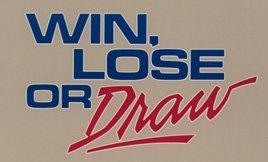
Win, Lose or Draw is an American television game show that aired from 1987 to 1990 in syndication and on NBC. It was taped at CBS Television City, often in Studios 31, 33, and 43 at various times. It was co-produced by Burt & Bert Productions and Kline & Friends for Disney's Buena Vista Television. It has also had two versions on The Disney Channel: Teen Win, Lose or Draw from 1989 to 1992, and a revived version known as Disney's Win, Lose or Draw which aired in 2014. New York described Win, Lose or Draw as "a knockoff" of the board game Pictionary, however, Burt Reynolds and Ed McMahon referred to playing the game at Burt's home during the August 2, 1978 episode of The Tonight Show, with Johnny Carson, three years before Pictionary was created.

Chain Reaction is an American television game show created by Bob Stewart, in which players compete to form chains composed of two-word phrases.

The Cross-Wits is an American syndicated game show which premiered on December 15, 1975, and lasted for five seasons until its cancellation on September 12, 1980. The show was hosted by Jack Clark, with Jerri Fiala as hostess. Announcing duties were handled by John Harlan, Jay Stewart, and Jerry Bishop. The show was produced by Ralph Edwards Productions and distributed by Metromedia Producers Corporation.

Caesars Challenge is an American game show that aired on NBC from June 14, 1993, to January 14, 1994, and was recorded at the Circus Maximus Theatre of Caesars Palace in Las Vegas, Nevada. Ahmad Rashad hosted the series and, in keeping with the theme of the show's location, he was assisted by a man dressed as a Roman gladiator. Dan Doherty played the role for most of the show's run, with Chad Brown and Zach Ruby handling the earliest episodes before Doherty joined the show.
Lingo is a Canadian game show that ran for 439 episodes on Télévision de Radio-Canada across Canada, from 1998 to 2001. It was hosted by longtime actor and radio/TV host Paul Houde. The show's format combined the structure of the game of chance known as bingo with a word guessing game; contestants took turns guessing five-letter words and tried to guess enough of them to fill in enough spaces on a five-by-five card to form a line.
PDQ and Baffle are American television game shows created by Heatter-Quigley Productions. Both shows' objective was for contestant/celebrity teams to guess a given word or phrase in the shortest amount of time with the fewest letters given as possible.
Camouflage is a television game show that aired on Game Show Network. Hosted by Roger Lodge, and billed as "the hidden word game where the answer is always right in front of you", Camouflage originally aired for 40 episodes from July 2 to 27, 2007. The show is a word game, with contestants searching for a hidden word or phrase in a string of jumbled letters. The show is produced by Enjoy the Ride Productions in association with McB Entertainment.

Bingo America is an American game show broadcast by Game Show Network. The series follows two contestants as they try to compete to win up to $100,000. Additionally, the series lets at-home viewers print bingo cards online that allow them to play along with the show to win small amounts of money for themselves.
Lingo is a British game show based on the American programme of the same name, the original iteration of the programme was made by Thames Television and Action Time for ITV, running for a single series with host Martin Daniels from 12 May to 14 July 1988. A revived version has also aired from 1 January 2021 hosted by Adil Ray.
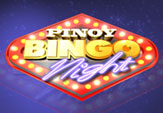
Pinoy Bingo Night is the Philippine game show version of National Bingo Night, which premiered on the ABS-CBN from March 30 to June 26, 2009 replacing the third season of Kapamilya, Deal or No Deal and was replaced by The Wedding. It is hosted by Kris Aquino with Brod Pete as the "bingo caller" and Mel Feliciano as the "commissioner", who referees the playing studio audience.

Lingo is a television game show that aired in the Netherlands between 1989 and 2014, and returned in 2019 on the commercial channel SBS6. Since 2022, it is aired on the commercial channel Net5. The format consists of a word game that combines Mastermind and Bingo.
Family Game Night is an American television game show based on Hasbro's family of board games and EA's video game franchise of the same name. The show was hosted by Todd Newton. Burton Richardson was the announcer for the first two seasons; he was replaced by Stacey J. Aswad in the third season, and Andrew Kishino was hired for the fourth season. The 60-minute program debuted on October 10, 2010, on The Hub ; it was previewed on October 9, 2010, on its sister channel, TLC. Seasons 1 and 2 contained 26 and 30 episodes respectively. Seasons 3, 4 and 5 each contained 15 episodes. Season 2 premiered on Friday, September 2, 2011, with additional games being added. The games added to the second season included Cranium Brain Breaks, Green Scream, Ratuki Go-Round, Simon Flash, Operation Sam Dunk, Trouble Pop Quiz, and Spelling Bee. However games from the previous season were still kept.
Idiotest is an American television game show broadcast by Game Show Network (GSN). Hosted by Ben Gleib, the series features contestants in teams of two competing to answer brain teaser and puzzle questions. The winning team advances to a bonus round for an opportunity to increase their winnings to $10,000. The series was announced at GSN's upfront presentation in March 2014, and the first episode premiered on August 12, 2014 of that year. On December 15, 2018, the first season became available to watch on Netflix.

America Says is an American television game show hosted by John Michael Higgins and broadcast on Game Show Network. The series consists of two teams of four guessing the top answers to fill-in-the-blank survey questions. It is a restructuring of the Audience Match portion of Match Game.
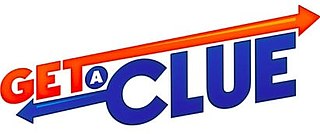
Get a Clue is an American television game show hosted by Rob Belushi that aired on Game Show Network from January 6, 2020 to April 16, 2021.

Tug of Words is an American television game show that aired on Game Show Network from November 8, 2021 to February 15, 2023.



